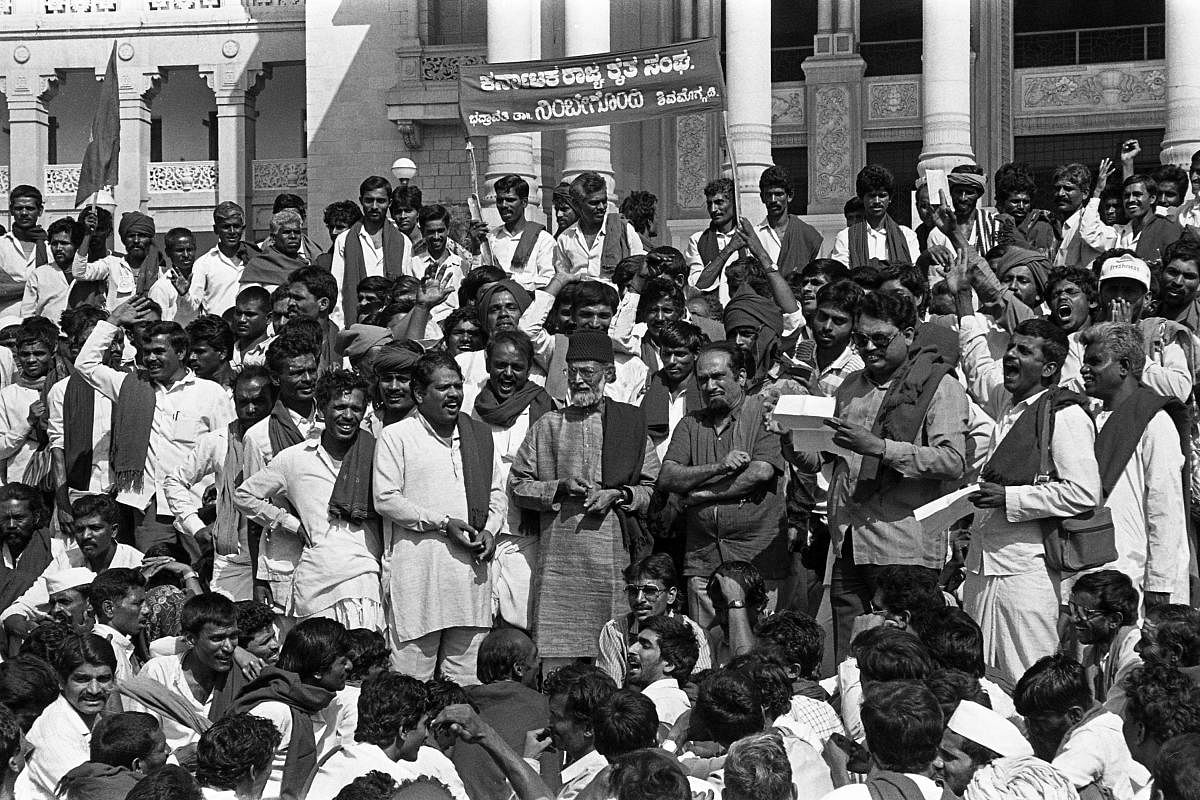Karnataka's defining moments: A fierce farmers' agitation that spread itself too thin


The peasant movement in Karnataka has come a long way from the days of the Dinakar Desai-led land struggle in the 1940s and the famous Kagodu Satyagraha in 1951, in which veteran socialist Dr Ram Manohar Lohia had participated.
Even if the farmers’ movement never really took off as an alternative political force, there were moments when it had a great influence on political discourse and held the potential to transform Karnataka’s socio-economic edifice.
In the 1980s, Prof M D Nanjundaswamy (MDN) took the farmer’s movement and the Karnataka Rajya Raitha Sangha (KRRS) to its peak. Starting with the Naragunda-Navalgunda Bandaya (rebellion), the KRRS campaigned on various issues.
Two farmers were killed in this historical farmers’ uprising against a water tax imposed by the government. The then Chief Minister R Gundu Rao’s harsh handling of the rebellion was criticised widely, which eventually led to the formation of the first non-Congress government in the state. These developments helped KRRS to consolidate its position as a state-wide organisation.
Early campaigns
The KRRS opposed the forceful recovery of loans and subsequent attaching of property, the imposition of levy price for sugarcane and demanded free electricity, subsidy for fertilisers, higher support price and so on. These demands were aimed at consolidating the gains of the green revolution.
Prof Nanjundaswamy, a lawyer and staunch Lohiaite, not only led the fight against adverse implications of the government’s neo-liberal policies but also infused self-respect and pride among the farmers of Karnataka. The KRRS also staged a relentless struggle against the introduction of GM crops and biotechnology, it opposed the patenting of seeds and fought against multinational companies such as Cargill and Monsanto that promoted such technologies in India.
To conceptualise its anti-globalisation stance, the KRRS took a strong position — Western capitalism was not only trying to capture the markets of the Third World but was also trying to appropriate the natural resources and biological diversity of countries like India.
In this context, the KRRS raised the slogan of food sovereignty, attempted to conserve traditional crop varieties and initiated discussions on sustainable development though this did not take off comprehensively.
Electoral politics
In the meantime, Prof MDN also made futile attempts to pursue his struggle through electoral politics by founding a political party called Kannada Desha and contested the elections but without much success. One of the reasons for its failed attempt was that it had to compete with established political parties, which shared a common social base.
The movement eventually fizzled out in the late nineties and it didn’t take much time after the death of MDN for the KRRS to split into several factions. The disintegration had started much before, when MDN emerged as a spokesperson of the Third World farmers. This led to the organisation spreading itself thin and focusing on too many issues, instead of the ones that required their direct attention.
The green shawl sported by Karnataka’s farmers is all that remains of this once vibrant political movement.
While Raitha Sangha looked at the larger issues of sustainable agriculture, the Organic Farming Movement led by progressive farmers like Narayana Reddy, D D Bharamagoudra and Purushotham Rao was evolving in the state as well.
Karnataka also became one of the first states in the country to have an organic farming policy in 2004.
Challenges continue
The KRRS was first to raise its voice against trade liberalisation but the fear of import and dumping of the farm commodities through bilateral and regional agreements such as Regional Comprehensive Economic Partnership persists even today.
While farmers’ organisations undertake protests and march against anti-farmer policies, the governments are moving ahead with privatising and facilitating the corporate takeover of the farm sector.
The way in which recent Farm Acts of the Centre and amendments to APMC and Land Reforms Acts by the state government were passed, by taking the ordinance route, is a clear indication of the ruling dispensation’s intention in this regard.
Farmers’ organisations must seriously ponder over how they can enhance their bargaining power not only in the market but also in electoral politics, and in the meantime look at larger issues of sustainable farming and food sovereignty.
(The author is an agriculture economist, and Former Chairman, Karnataka Agricultural Prices Commission)
Deccan Herald is on WhatsApp Channels| Join now for Breaking News & Editor's Picks